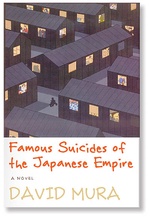If history tells us anything, it's what mistakes we've made and how we may attempt to fix them. David Mura takes us on the journey of a middle aged academic working below his real or imagined potential as he pursues both closure to his family's difficult past in the form of an elusive and ambitious literary project. Famous Suicides of the Japanese Empire shares the title of the book by the main character, Ben Ohara, who struggles with depression, professional insecurity and the joys and responsibilities of having a family of his own. The subject of Ben's unfinished book serves as the framework for his trip through the unresolved issues from his childhood and the aftereffects of his father's early death by his own hand.
The story begins with a memory. Ben recalls an incident with his father and brother, both lost to him now—out of reach and impossible to save. He then launches into an honest appraisal of his life, his insecurities and his past. Ben tells the story of the Ohara family like the unraveling of a Japanese scroll, important scenes revealed one at a time, each painting a richer and more complete picture of the last. Little by little we understand the dark secret his father and mother hide, a secret that not only destroys his father's confidence and self-worth, but also directly affects his mother, himself and his younger brother. The deep sadness that shrouds his father and the absence it causes both physically and emotionally forces his mother to carry the burden of providing for and raising two boys. Grappling with prejudice as a young boy and doing his best to survive in a rough neighborhood, Ben reacts to his father's depression and frequent disappearances by acting out and slipping into juvenile delinquency. His younger brother, Tommy, is born a genius, difficult to comprehend as a child, and even harder to relate to as an adult. Tommy grows up without his father or older brother around and reacts to the 1960s and 1970s with anger and defiance, disappearing for good into the desert one summer night.
It is refreshing to have a story trace the direct psychological effect of incarceration in the camps during WWII, but from a different perspective than what is normally heard. Resistance to the draft instituted in camp was not necessarily something to be proud of after the war was over as the 442nd Regimental Combat Team/100th Battalion proved above and beyond to white America the loyalty of Japanese Americans. Living in the shadow of the bravery of the WWII veterans, Ben's father buckles under the pressure of supporting his family in post-wartime with the stigma attached to his identity as a No-No boy. Starting over with nothing, unable to get a job because of his status, Ben's father fades into his own sadness and depression, leaving his sons in the dark about his own brand of heroism and his wife to support and raise the two boys by herself. Ben and Tommy lose their father little by little, as he detaches from the family and leaves for long periods of a time until one day, he just doesn't return. Tak's suicide continues a legacy that started with the forced evacuation of Japanese and Japanese Americans. David Mura illuminates some of the heartbreaking choices people were forced to make and the lasting effects of these decisions by showing us the lineage of humiliation of Tak's status as a No-No boy.
The casual tone of the book is, I assume, a way of indicating Ben's background as a regular guy, reflecting both is past as a juvenile delinquent and differentiate him from his younger brother, a troubled genius who disappears into the Nevada desert some ten years earlier. Unfortunately, the style comes across instead as bit poorly written and a little melodramatic. But allowing us to hear Ben's uncensored thoughts about his past, and his present, allows the reader to join him in his discoveries, both painful and healing. The story is riveting and the family's adventures and interaction with each other are enough to keep the reader's care and attention. And the nature of Ben's book, while sometimes a bit heavy-handed and obvious, help the reader follow Ben's train of thought as the circumstances of these ancient suicides echo through Ben's journey to resolution.
Ben's manuscript is saddled with an undeserved burden, symbolizing all that went wrong in his academic career and that, when finished, will prove to himself his professional self worth. Using the book as an excuse to travel to places where he seeks resolution to unfinished family business, Ben manages to trace the struggles of his family, father, mother and the two brothers, and the direct repercussions of his father's resistance during World War II. He finds a place of peace, finally finding the dusty grounds of the camp where his father's legacy of sadness began, and hopefully with this visit, will end.
"Famous Suicides of the Japanese Empire"
By David Mura
Coffee House Press, 2008
© 2008 Susan Kellogg



